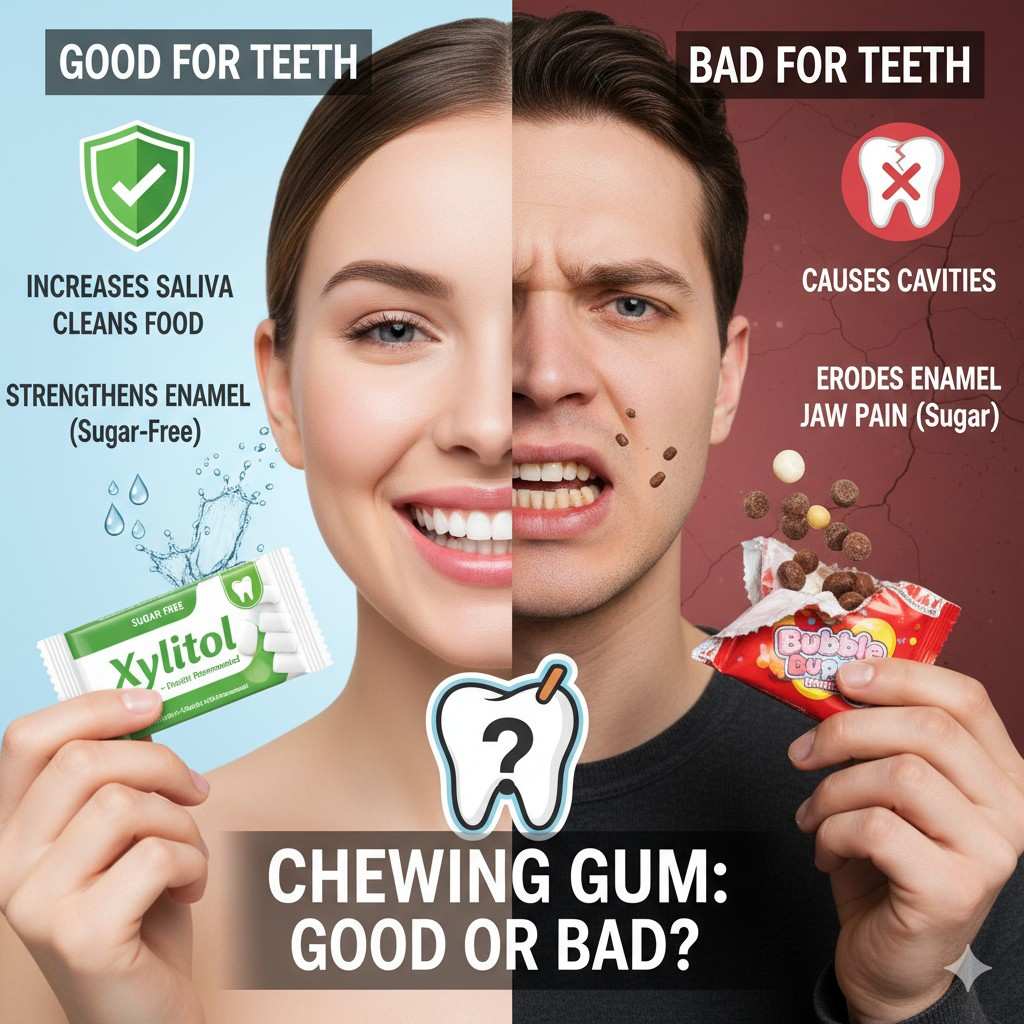Is Chewing Gum Bad or Good for Your Teeth?
Chewing gum is a habit enjoyed by many—whether it’s for freshening breath, curbing cravings, or simply passing the time. But one common question we hear at King and Weston Dental is: Is chewing gum bad or good for your teeth?
The short answer? It depends on the type of gum you’re chewing and how often you’re chewing it. While some gum can be harmful to your dental health, other types—particularly sugar-free varieties—can actually help keep your teeth and gums healthier.
Let’s break it down.
The Good: How Chewing Gum Can Help Your Oral Health
- Stimulates Saliva Production
One of the biggest benefits of chewing gum—especially sugar-free gum—is that it increases saliva flow in your mouth. Saliva is a natural cleanser that helps:
- Wash away food particles
- Neutralize acids produced by bacteria
- Strengthen tooth enamel with essential minerals like calcium and phosphate
After meals, chewing sugar-free gum for 20 minutes can help reduce the acid attack that occurs when bacteria break down leftover sugars and starches in your mouth.
- Reduces Risk of Tooth Decay
Several clinical studies show that chewing sugar-free gum, particularly varieties containing xylitol, can reduce the risk of cavities. Xylitol is a natural sweetener that not only tastes sweet but also helps fight harmful oral bacteria.
Unlike sugar, bacteria in the mouth can’t metabolize xylitol, which means they starve and multiply less. Over time, this can reduce the amount of cavity-causing bacteria in your mouth.
- Helps Clean Teeth Between Brushing
While chewing gum is not a substitute for brushing and flossing, it can serve as a temporary cleaning aid—especially when you’re on the go. Gum helps dislodge food particles and freshen breath after meals or snacks when brushing isn’t possible.
- May Help Prevent Dry Mouth
For people who suffer from dry mouth (xerostomia), chewing sugar-free gum can be a simple and effective way to relieve symptoms. Dry mouth increases your risk for tooth decay, so anything that stimulates saliva can help protect your oral health.
The Bad: When Chewing Gum Can Be Harmful
- Chewing Gum with Sugar
Traditional chewing gum often contains sugar—exactly what the bacteria in your mouth love to feast on. As they digest the sugar, these bacteria produce acid that erodes tooth enamel and leads to cavities.
If you frequently chew sugary gum, you’re increasing your risk of decay, especially if you don’t brush regularly after chewing.
- Jaw Problems (TMJ Issues)
Constant gum chewing, especially on one side of the mouth, can lead to jaw strain or worsen symptoms of temporomandibular joint disorder (TMJ). TMJ affects the joints and muscles that allow you to open and close your mouth.
If you experience symptoms like jaw pain, popping, or headaches, it’s best to avoid frequent gum chewing or consult your dentist for guidance.
- Artificial Sweeteners and Sensitivities
While sugar-free gum is generally safe for most people, some gums use artificial sweeteners like sorbitol or aspartame, which can cause digestive issues or sensitivities in certain individuals. Always read labels if you have known reactions to these ingredients.
Best Practices for Chewing Gum
If you enjoy chewing gum and want to do it in a way that benefits your teeth, here are some quick tips:
- Choose Sugar-Free Gum: Look for gums that have the ADA Seal of Acceptance, which ensures they meet safety and effectiveness standards for oral health.
- Opt for Xylitol: Xylitol-sweetened gums are especially beneficial for fighting cavity-causing bacteria.
- Chew After Meals: Chewing gum for 15–20 minutes after eating can help neutralize acids and clean the mouth.
- Don’t Overdo It: Moderation is key. Chewing gum excessively—especially several hours a day—can cause jaw fatigue or digestive discomfort.
- Combine with Good Oral Hygiene: Gum should never replace brushing and flossing. Maintain a solid oral hygiene routine with twice-daily brushing, daily flossing, and regular dental checkups.
So, Is Chewing Gum Good or Bad for Your Teeth?
In most cases, chewing sugar-free gum in moderation is beneficial for your dental health. It’s a simple and effective way to support saliva production, reduce acid attacks, and even freshen your breath throughout the day.
However, if you’re chewing gum with sugar or overdoing it, you may be doing more harm than good.
At King and Weston Dental, we encourage our patients to make informed decisions about their oral health habits. If you’re unsure about which products to use—or if chewing gum is right for you—our team is happy to help you choose the best options for your smile.
Need advice on maintaining a healthier smile?
Schedule an appointment with King and Weston Dental today. We’re here to help you chew wisely, smile brighter, and keep your oral health on track.

